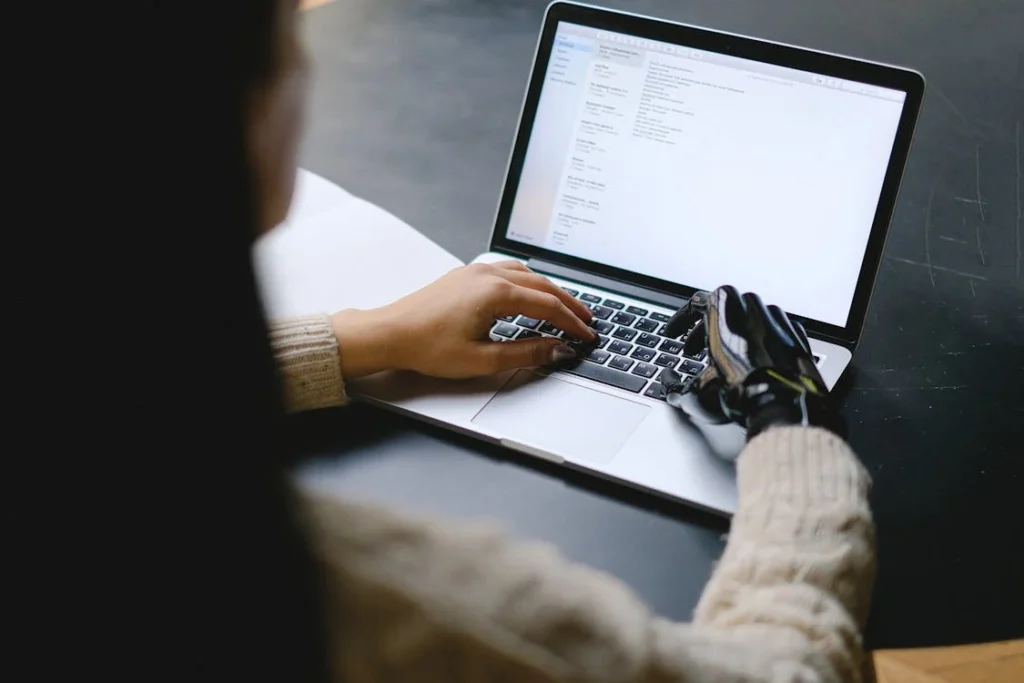Warangal is a city known for its history, strength, and spirit. Life here moves with quiet determination — whether it’s in the fields, on campus, in the markets, or along the growing cityscape. But for someone who has lost a hand, this daily rhythm can suddenly feel overwhelming. Tasks that were once simple become difficult. Movements once taken for granted feel impossible. And while the heart still wants to move forward, the body struggles to keep up.
At Robobionics, we understand this deeply. Because for us, prosthetics are not just about technology. They are about people. About real lives being lived in places like Warangal, where support must come not just in machines, but in understanding. Our mission is to bring world-class bionic hands to cities like yours — without the high costs, the long waits, or the complicated systems that keep people from getting the help they need.

What Makes Robobionics the Right Choice for Warangal
A City That Deserves More Than Just Access
Warangal is not just a heritage site or a growing urban hub. It’s a city where families work hard, students dream big, and people rely on both tradition and modern tools to shape their future.
Losing a hand doesn’t change that spirit — but it can make daily life harder than it needs to be. From handling money at a shop counter to preparing food at home, from writing in a classroom to traveling on a scooter — everything depends on your hands.
And when one is lost, it’s not just about the hand. It’s about your freedom.
What we’ve seen again and again is that many people in cities like Warangal don’t lack the will to recover — they simply lack the right support. Big prosthetic brands may offer fancy promises, but they often don’t understand how people live here.
They don’t understand the heat, the pace, the needs. And more importantly, they don’t stay long enough to help when something goes wrong.
That’s where we come in. Robobionics builds for people like you — people who want to keep moving, to stay strong, and to feel whole again without needing to leave their hometown or spend beyond their means.
Designed for Indian Lives — Not Just for Display
Too many prosthetic devices are made for show. They’re built in labs, tested in cold rooms, and designed around a limited set of tasks. But life in Warangal is not limited.
It is active, fast, demanding, and real. That means your bionic hand must do more than just open and close. It must move with you, adapt to your day, and feel like part of you — not like something extra that slows you down.
At Robobionics, we design from the ground up for Indian conditions. That starts with the materials. Our hands are built with heat-resistant, sweat-tolerant shells that don’t slip or irritate the skin.
The sensors are tuned to work even when you’re active or perspiring. And the battery lasts a full day because we know you don’t want to pause your life just to recharge.
We’ve had users from southern India tell us how relieved they were when their Robobionics hand didn’t heat up or stop working after hours of wear in the sun.
That’s not a feature we added by accident. That’s a decision made by listening — really listening — to what our users go through.
Simple to Use, Easy to Learn, Built for Your Routine
You shouldn’t need an engineering degree to use your prosthetic. And you shouldn’t need to stop every few minutes just to adjust it. Our goal has always been to make bionics feel natural — like your hand simply came back.
The Robobionics hand responds to your muscle signals. You don’t need to press switches or scroll through controls. Just move your muscles as if the hand were still there — and the bionic hand follows.
At first, this may feel strange. But with a few days of training, your brain and body begin to adjust. Movements become smoother. Tasks become easier. And slowly, you begin to trust the hand — not just as a device, but as part of you.
For people in Warangal, this means being able to do regular things again. Turning on the gas. Holding a book. Pouring tea. Locking your front gate. Using your phone.
The confidence that comes with each small success is powerful. And you don’t have to wait weeks to experience it.
Our training modules are short, simple, and available in local languages. If you’re not comfortable with tech, we adapt. If your family wants to help, we include them. Recovery is not just physical. It’s emotional. And we build for both.
Affordability That Doesn’t Cut Corners
Many people believe that a high-quality bionic hand must come with a high price. That may be true elsewhere. But not with us. Robobionics is an Indian company, building in India, for Indian people. That gives us an edge in both cost and service.
We control our entire supply chain — from parts to production to fitting. We don’t pay foreign shipping. We don’t depend on imported components. That means no hidden fees. No inflated costs. And no long delays if something breaks.
But we’ve done more than just cut costs. We’ve built systems to help. Whether it’s flexible payments, NGO partnerships, or government support channels, we guide you step by step.
We’ve worked with farmers, teachers, students, and shop owners — all with different income levels, and all now fitted with hands that help them work, live, and move on.
In Warangal, where people are smart with money and careful with promises, this matters. You’re not buying a gadget. You’re investing in a better tomorrow. And we make sure that investment is worth every rupee.
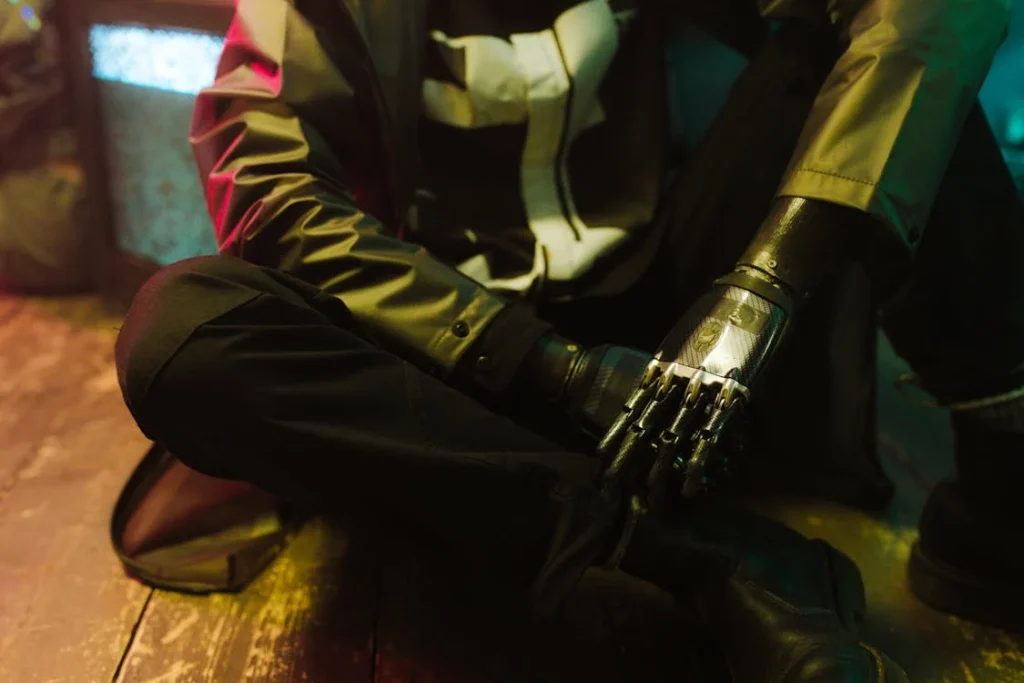
Bringing Dignity Back to Everyday Life in Warangal
Rediscovering Independence in Simple Actions
After losing a hand, many people in Warangal find themselves stuck in silence. It’s not just the physical absence of a limb — it’s the quiet embarrassment that begins to color simple routines.
When you can’t eat with ease, or you fumble while paying at a store, or you avoid lifting a bag in public, it chips away at confidence little by little. These aren’t just moments of inconvenience. They are moments where dignity feels interrupted.
At Robobionics, we work to bring that dignity back — one movement at a time. We’ve seen users pick up a spoon with hesitation on day one and lift a steel plate confidently by day five.
We’ve had parents tell us that their child stopped hiding their hand after school once they began using our bionic device. This kind of change is subtle, but life-changing.
It doesn’t happen because of just wires and motors. It happens because the hand fits into the person’s routine without demanding attention.
Our goal has never been to impress. It’s to support. When a person walks down the street in Warangal wearing one of our prosthetic hands, our hope is not that people notice the technology.
Our hope is that no one notices anything unusual at all — because that means the person feels whole again.
Fitting That Goes Beyond Measurements
Many prosthetic manufacturers rely only on technical data. They measure your limb, fit the socket, and then leave you to adjust on your own. But we know that every arm is different — and so is every lifestyle.
A student has different needs from a farmer. A mother has different concerns than a shopkeeper. That’s why we take time to understand how you live, what you do, and where you struggle.
In our fittings, we don’t just look at your arm. We ask you how you travel, what your job is, how long you need to wear the hand, what movements you do most, and how you feel about using it in public. These questions shape the entire design and setup process.
If you spend long hours standing, we consider weight balance. If you work outdoors, we make sure the grip can handle sweat and heat.
If you use both hands while cooking, we fine-tune the responsiveness to make sure nothing slips. This is what makes Robobionics different. We fit people — not just limbs.
In Warangal, where family members are often deeply involved in recovery, we also invite them into the process. We teach them how to help without overwhelming the user.
We answer their questions — even the quiet ones they hesitate to ask. Because when a loved one is empowered with knowledge, the whole recovery becomes smoother.
Confidence That Doesn’t Depend on Explanations
One of the most overlooked parts of using a prosthetic is how often people feel they need to explain themselves.
Whether it’s to strangers, coworkers, or even extended family, prosthetic users often find themselves giving more explanations than they want to. What happened? Does it hurt? Can you use it like a real hand? These questions, even when well-meaning, can become exhausting.
That’s why design matters just as much as function. Our hands are created not only to work well, but to look sleek and modern — so they don’t attract unnecessary attention, unless the user wants to talk about them.
Some users prefer skin-toned covers that blend in. Others enjoy a futuristic style that shows their recovery proudly. Either way, the choice is always theirs.
We’ve had users tell us that the first time they used their Robobionics hand in public, they didn’t feel the need to hide it. That alone made them walk a little straighter, speak a little louder, and feel a little better. And that’s what a good prosthetic should do. Not just function. But free you from shame.
In a city like Warangal, where society and community often shape self-image, this matters a lot. It allows users to return to festivals, to public transport, to weddings, to workplaces — not as someone recovering from something, but simply as themselves again.
Durability That Matches the City’s Energy
Warangal is always on the move. From busy intersections to lively campuses, from street vendors to healthcare workers, people here don’t slow down. That’s why a prosthetic must keep up. It can’t be delicate. It can’t require special handling. It has to be ready when you are.
That’s how we build. Our bionic hands are strong, without being bulky. Responsive, without being fragile. You can wear it for eight hours, ride a two-wheeler, carry groceries, and still have charge left at the end of the day.
And if anything feels off, you don’t have to wait for someone from a faraway city to arrive. Our support is close, quick, and ongoing.
For users in Warangal who rely on local travel, who visit relatives frequently, who work in dynamic conditions — this kind of durability is not a luxury. It’s a necessity. And we never forget that.
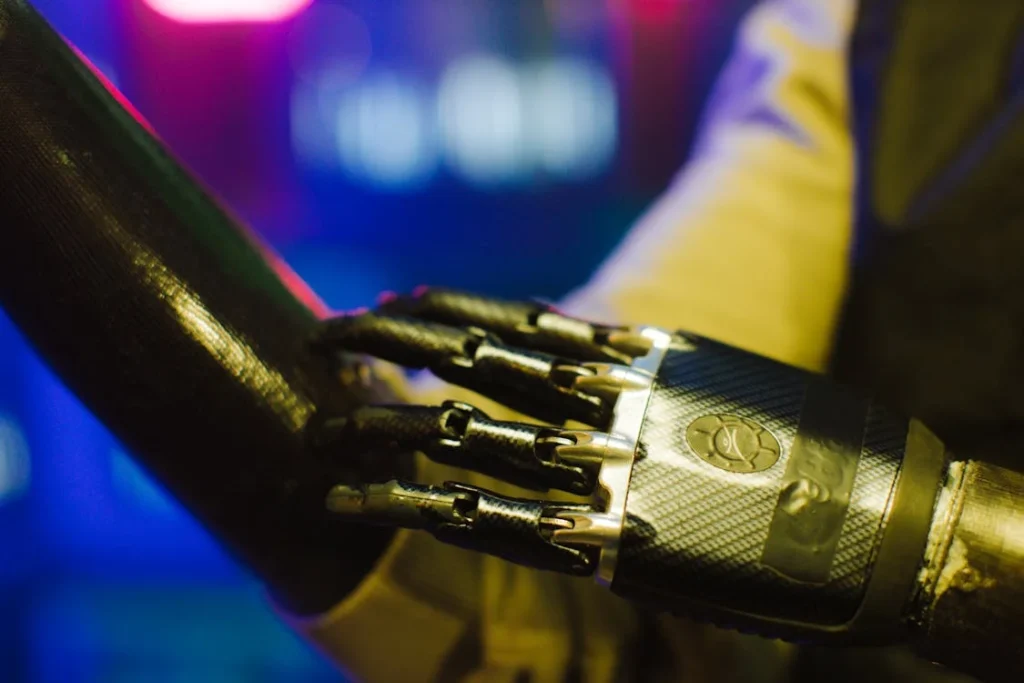
Robobionics in Warangal: More Than a Device, It’s a Promise
A Local Approach to Global Technology
Too often, people in cities like Warangal are made to feel that the best solutions lie far away — in metros, in foreign hospitals, in companies whose support ends after the sale.
But that’s not true. Technology is only as good as the people behind it, and care is only real when it continues after the product is delivered.
At Robobionics, we didn’t just bring world-class prosthetic technology to India. We redesigned it for the way people live here. That means we look beyond mechanics.
We pay attention to climate, culture, and the pace of local life. We know that a hand used in Warangal needs to handle daily temple visits, scooter rides, office work, chores, and social events — all without needing constant adjustment or specialist help.
That’s why our fittings are done with careful attention to how your week looks, not just how your limb looks. Our support team speaks your language.
Our response time is fast. And our partnerships with local rehab providers and clinics mean that you’re never more than a phone call away from someone who knows what to do if something needs fixing or fine-tuning.
You are not just our customer. You are our responsibility — and that doesn’t change with distance.
Re-entering the Workforce with Strength and Skill
A major concern for many people who have lost a limb is whether they’ll be able to work again. Whether it’s formal employment or self-employment, the thought of being seen as less capable can make people hesitate.
In Warangal, where many families depend on a single breadwinner, even a short break from work can strain an entire household.
We understand this deeply. That’s why Robobionics is more than a prosthetic provider — we are also your partner in getting back to work.
When we fit your bionic hand, we ask about your profession. Do you work with paper or tools? Do you handle cooking or cleaning? Are you working at a cash counter, on a computer, or in a clinic? These details matter.
We use them to fine-tune your grip strength, your hand posture, and your control responsiveness. Because a well-fitted bionic hand can help you get back to the same job — or explore something new.
We’ve helped mechanics return to workshops. We’ve helped nurses go back to hospitals. We’ve seen shop owners begin serving customers again with confidence. And every time someone tells us they’re earning again, we celebrate it more than any award or review.
Sometimes, returning to work isn’t just about income. It’s about identity. It’s about feeling useful, respected, and independent again. Our technology supports that — not just physically, but emotionally.
Bionic Hands for Students and Youth in Warangal
Warangal is home to some of Telangana’s most promising students and campuses. From the National Institute of Technology to local degree colleges and vocational training centers, young people here have big ambitions. But for a student who’s lost a limb, education can suddenly feel like a harder path.
Writing, typing, carrying books, handling tools — these are all daily classroom actions that become difficult without the right prosthetic. And for teenagers, there’s also the worry of standing out, of being asked questions, of being pitied.
At Robobionics, we design solutions that help students in Warangal stay focused on their goals — without feeling limited.
Our hands are lightweight enough for long school days, quiet enough for use in classrooms, and intuitive enough to make writing or typing smoother after just a few weeks of training.
But we don’t stop at the product. We work with families and schools to create understanding. We help teachers know how to support, not hover.
We guide students in how to answer questions confidently, or how to move past teasing without shame. Because education should not be interrupted by fear. It should be strengthened by resilience.
One of our youngest users from Warangal now writes exams with his bionic hand. His family once feared he would fall behind. Today, he’s at the top of his class. And the hand he once hid under his desk is now something he wears with pride.
The Emotional Journey We Walk Together
The path from limb loss to recovery is not a straight line. It’s full of moments — some hopeful, some hard. There are days when you feel progress. There are days when frustration returns. At Robobionics, we don’t pretend this is easy. But we promise that you won’t go through it alone.
Our users in Warangal are part of our extended family. We check in. We ask how you’re feeling — not just how the device is working. We offer reminders, tips, and gentle encouragement when needed. And we celebrate your milestones with you, big and small.
Sometimes, just being able to eat with your family without help is a victory. Sometimes, riding your scooter again is the moment you’ve waited for.
We’ve had users tell us their confidence came back not when the hand worked, but when someone finally saw them smile again in a photograph.
These stories are not side effects. They are the reason we do what we do.
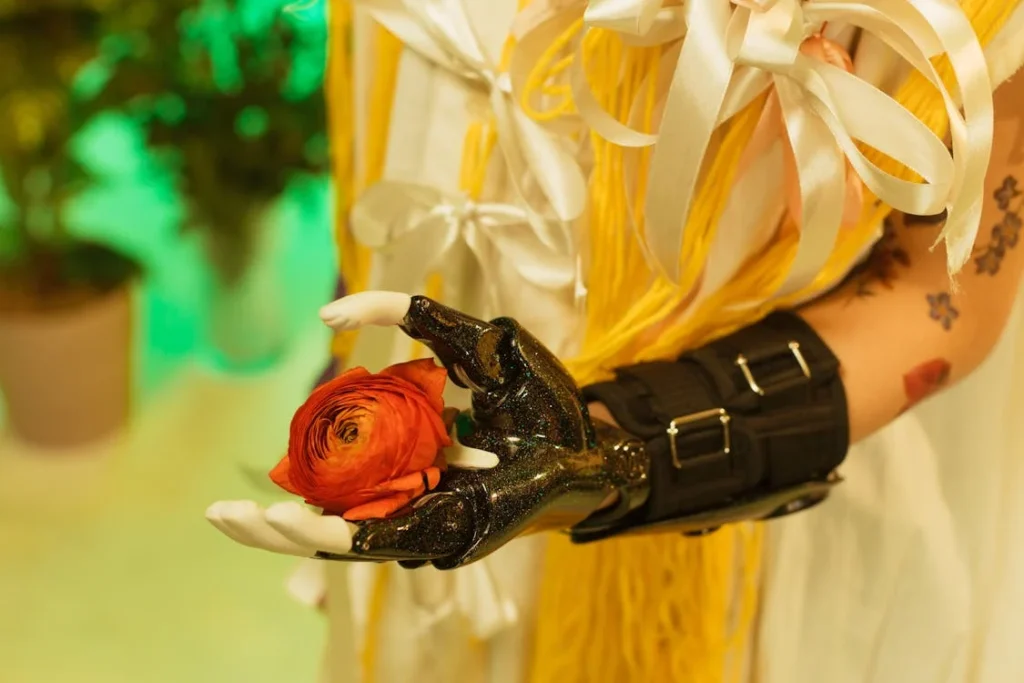
Building a Culture of Inclusion in Warangal Through Empowerment
Changing the Way People See Prosthetics
In many towns and cities across India, prosthetics are still surrounded by silence or stigma. Warangal is no different. People mean well, but curiosity, pity, or assumptions often lead to uncomfortable moments.
A child might stare. A shopkeeper might hesitate. A distant relative might ask too many questions. And slowly, the person using a prosthetic begins to withdraw — not because they can’t do things, but because they’re tired of explaining themselves.
At Robobionics, one of our missions is to change that. We believe that using a prosthetic shouldn’t make you feel different. It should help you feel stronger.
That’s why our design choices go far beyond engineering. We think about how your hand will look during festivals, how it will feel when you sit for lunch with friends, and how it will respond when someone reaches out for a handshake.
Some of our users in Warangal have shared that their biggest fear wasn’t using the hand — it was what people would think. We worked with them to choose finishes that matched their comfort, helped them practise gestures they felt unsure about, and even offered tips on how to answer questions with confidence instead of discomfort.
Now, those same users are inspiring others. They walk into community spaces not as people who lost something, but as people who overcame something.
That shift — from avoiding attention to owning their story — is where real change begins. And once that confidence spreads, the people around them begin to see prosthetics not as a sign of disability, but as a symbol of strength.
Designed to Keep Up With Cultural and Religious Traditions
Another important — but often ignored — aspect of living with a prosthetic in India is how it fits into daily cultural and religious life.
In Warangal, where tradition runs deep and daily rituals are a natural part of routine, it’s essential that your bionic hand supports your way of living, not complicate it.
We’ve heard stories from users who were told they couldn’t perform pooja properly or that they’d no longer be able to participate in ceremonies the same way.
Others felt nervous about attending weddings or large family functions, unsure of how people would respond. These are quiet battles — the kind that don’t show up in medical charts, but that matter deeply to the heart.
Our hands are designed with this in mind. The motion range allows users to perform traditional gestures like lighting incense, offering aarti, or tying sacred threads.
Our lightweight design ensures that long hours of wear — like during religious ceremonies or family gatherings — don’t become physically uncomfortable. The look of the hand, which can be customized, means you never have to feel out of place while wearing festive attire or participating in events where appearance matters.
We don’t believe that tradition and technology are at odds. In fact, we believe they belong together — and when designed thoughtfully, they can lift each other up.
The Role of Family in the Recovery Process
In Warangal, as in much of India, family plays a central role in every stage of healing. From initial care after an accident or illness to emotional support during recovery, your family isn’t just a bystander — they’re part of your strength.
That’s why, at Robobionics, we don’t design our support system just for the user. We include the family at every step.
During fittings, we invite spouses, children, or siblings to join the session. We explain how the hand works in simple language, not technical jargon.
We teach them how to assist in putting on the socket or adjusting the fit, but also how to step back and let the user grow in independence.
We’ve seen that when families are informed and empowered, they become better supporters. They know when to encourage and when to let the user try alone. They stop hovering, and start cheering. And as confidence builds, the relationship becomes one of respect — not sympathy.
One user’s wife in Warangal told us that the day her husband made chai for the first time after getting his bionic hand, she cried quietly behind the door. Not out of sadness, but out of joy. Because that one act told her everything she needed to know — that he was finding himself again.
These moments don’t make headlines. But they make healing real.
Creating Pathways for the Next Generation of Users
As technology grows, it must remain inclusive. What works for one generation shouldn’t become outdated for the next.
At Robobionics, we’re deeply committed to making sure that the young people of Warangal — whether born with limb differences or facing loss due to injury or illness — have access to tools that help them reach their full potential.
We’re already working with educators and skill development programs to identify young people who could benefit from early intervention.
We’ve started school outreach programs where children learn about bionic limbs not as something strange, but as something normal and empowering.
We also create educational materials in local languages so that parents, especially in semi-urban areas, can understand the benefits of early prosthetic use without being overwhelmed by technical terms.
When a child learns to use a prosthetic at a young age, their brain adapts faster, their body becomes more balanced, and their confidence grows naturally.
But more than that — they grow up without the weight of shame. They grow up seeing themselves not as someone who lacks something, but as someone who is built differently, and beautifully.
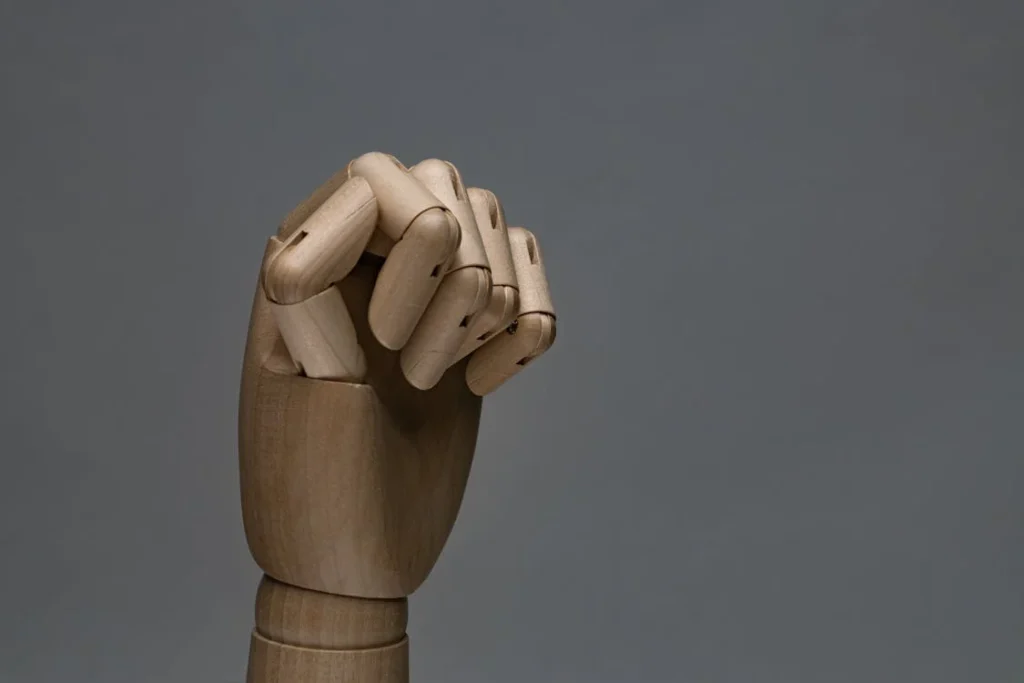
Robobionics and Post-Surgical Recovery: Supporting the Journey from Hospital Bed to Everyday Life in Warangal
The Critical Window After Amputation
The time immediately following an amputation — whether from trauma, illness, or medical necessity — is one of the most fragile yet important stages in a person’s life. Physically, the body is still healing.
Emotionally, the mind is struggling to understand the new reality. It’s during this window that the right guidance can make the difference between lifelong hesitation and a confident return to daily living.
In Warangal, we’ve worked with hospitals and rehabilitation centers to bridge the gap between surgery and real-world recovery. Too often, people are discharged without any clear roadmap on what to do next.
They may not know when to start prosthetic consultations, what kind of hand will suit them best, or how to manage the wound and residual limb while they wait.
Robobionics steps into this space early. We offer post-operative support through local clinics, telehealth consultations, and home visits where possible.
We help patients and their families understand how soon fitting can begin, what to expect during that process, and how to care for the limb so that healing stays on track. This kind of early intervention prevents complications and speeds up recovery — not just medically, but mentally.
Preparing the Mind and Muscles Before the First Fitting
Before a person ever wears a bionic hand, they must first regain control over their remaining muscles. These muscles are the signal source for the device, and they need to be gently reactivated and strengthened.
We call this stage pre-prosthetic training — and we bring it directly to Warangal through personalized exercises, therapist support, and check-ins that begin even before the hand arrives.
This preparation stage is often skipped by providers who rush to fit and deliver. But we believe the quality of your future control depends on how well your body is prepared for it.
During this time, we also begin emotional support — helping users set expectations, manage fears, and visualise what success can look like.
By the time their bionic hand is fitted, they’re not just physically ready — they’re emotionally open, mentally confident, and already familiar with the path ahead.
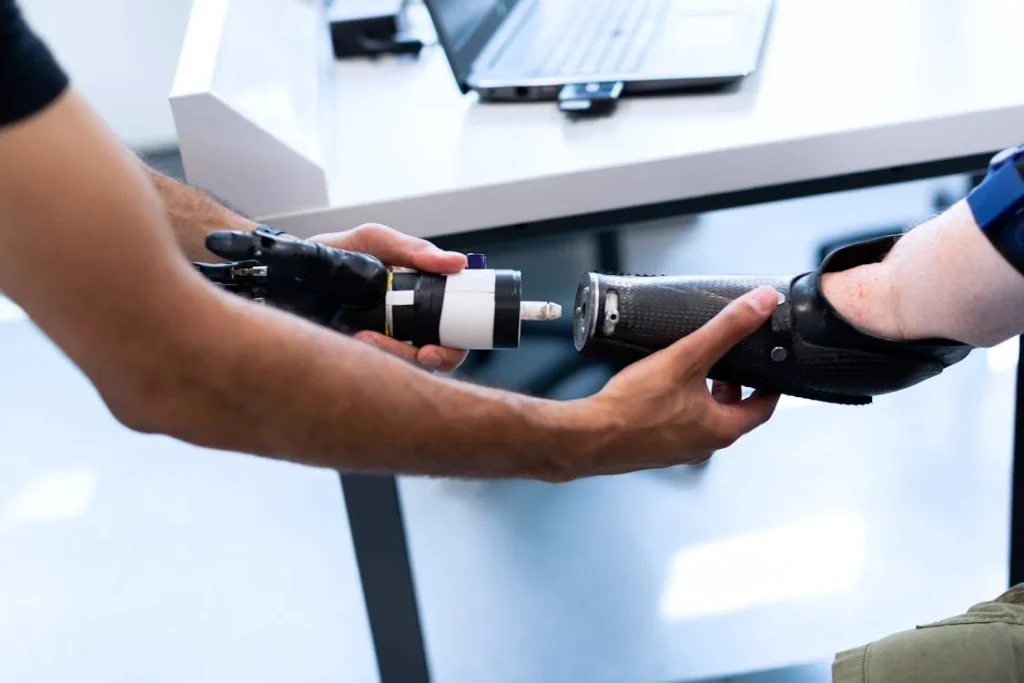
The Role of Peer Mentorship in Bionic Recovery: Learning from Those Who’ve Walked the Path
Why Real-Life Role Models Matter More Than Manuals
When someone in Warangal loses a hand, they’re often handed a stack of instructions, a few medical leaflets, and advice from professionals who may or may not truly understand what life feels like after limb loss.
But the truth is, no document — no matter how well written — can replace the reassurance of speaking to someone who has actually lived through it.
That’s why Robobionics has begun cultivating something rare and deeply powerful: a growing network of peer mentors. These are real users, from towns and cities just like Warangal, who have been through the emotional, physical, and practical journey of using a bionic hand.
They know what it feels like to go out in public for the first time. They remember the first meal eaten alone. They’ve learned how to deal with stares, glitches, and setbacks. And most importantly, they’ve come out stronger.
We connect new users — especially those who feel anxious, isolated, or unsure — with these mentors. Sometimes it’s a short video call. Sometimes it’s a message of encouragement.
Sometimes it’s a longer conversation, where one person quietly listens and another shares, with honesty and without judgment.
Peer Support Builds Confidence Faster Than Training Alone
Users who have access to peer mentors tend to gain confidence more quickly. They ask more questions. They explore more features. They stop seeing the prosthetic as foreign, and start treating it like something that belongs to them.
That’s because mentors do what no manual or professional can do — they normalize the experience.
We’ve had users in Warangal who started out afraid to even try the device. After just one conversation with a mentor from a nearby town, they were ready to wear the hand daily. Not because of technical advice — but because of human connection.
This is especially effective for women, teenagers, and elderly users, who may have very specific fears that only someone with similar experience can truly address.
A young woman might worry about how her peers will perceive her. An older man might question whether learning a new skill at his age is even worth it.
These aren’t technical questions. They’re identity questions. And they deserve answers from someone who understands the weight of those thoughts.
At Robobionics, we are not just building technology. We’re building a support system rooted in trust, lived experience, and shared strength.
Conclusion
In Warangal, where life is lived with quiet strength and deep purpose, limb loss doesn’t mean life stops. It means the journey takes a new turn — one that demands the right partner, the right support, and the right technology.
Robobionics is more than a prosthetics company. We are your companion through recovery, your guide in adaptation, and your team in reclaiming confidence. Our bionic hands are built not just for movement, but for meaning — designed to fit into your culture, your family, your work, and your dreams.
From early recovery to lifelong care, from emotional support to peer mentorship, we’ve made every part of the experience about one thing: helping you live on your own terms again. If you’re in Warangal and searching for not just a device, but a future you can hold with strength and pride — Robobionics is ready for you.



